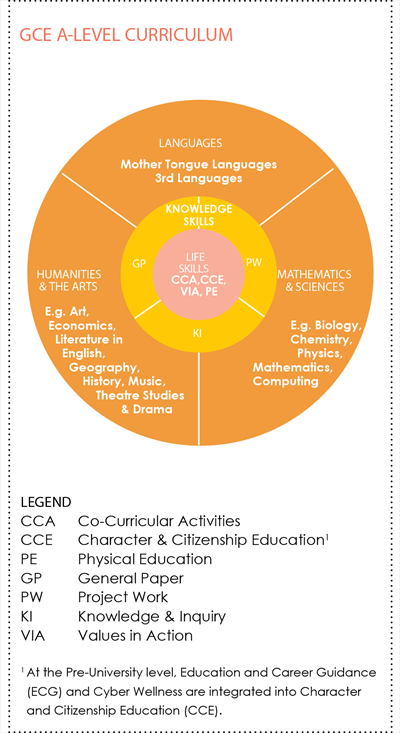Academic Curriculum
PROSPECTUS
Click here to
view ASRJC's E-Prospectus.
JC CURRICULUM
Starting from 2006, students entering Junior Colleges (JCs) and Millennia Institute take an A-Level curriculum that emphasises breadth of learning and flexibility.

(Source: https://www.moe.gov.sg/education/pre-university/gce-a-level-curriculum)
Students will be given opportunities to learn from the following three different disciplines: Languages; Humanities & the Arts; and Mathematics & Sciences. For instance, a Humanities/ Arts student will take at least one contrasting subject from the Mathematics and Sciences disciplines, and vice versa.
More information can be found on the Ministry of Education website.
Project Work
What is Project Work (PW)?
-
It aims to provide students with the opportunity to explore the inter-relationships and inter-connectedness of subject-specific knowledge; encourages students to break away from compartmentalised learning, and to develop the ability to integrate information and make meaningful links between different strands of knowledge.
-
A group of 4 or 5 students will conduct a project based on the project task given (i.e. question), under the supervision of a supervising tutor.
-
PW is calculated as a pass/fail subject. Students must pass PW for admission to the local autonomous universities.
What is the structure of PW?
Consists of 2 papers:
|
Weighting (%) |
||
|---|---|---|
|
Paper 1 |
(a) Written Report (WR)
|
40% of overall mark
|
|
Paper 2 |
Oral Presentation (OP)
|
50% of overall mark |
Offering Subjects at H3 Level
The H3 curriculum is designed to allow exceptionally strong students who have the ability to cope with a workload beyond the norm to pursue a subject or area for which they have the interest and aptitude. Students who offer H3 curriculum are therefore expected to be self-directed in their learning.
List of H3 Subjects
|
Examining Authority |
H3 Subject |
Pre-requisite |
|---|---|---|
|
Cambridge International Examinations (CIE) |
MOE-H3 Biology |
H2 Biology |
|
MOE-H3 Chemistry |
H2 Chemistry |
|
|
MOE-H3 Physics |
H2 Physics |
|
|
MOE-H3 Mathematics |
H2 Mathematics |
|
|
MOE-H3 Tamil Language and Literature |
H2 Tamil Language and Literature |
|
|
National University of Singapore (NUS) |
Geopolitics: War and Peace |
H2 Geography or H2 History |
|
Humanities and Social Science Research |
Relevant H2 Humanities subject or Language |
|
|
Nanyang Technological University (NTU) |
Semiconductor Physics and Devices |
H2 Physics |
|
Molecular Biology |
H2 Biology |
|
|
Singapore Management University (SMU) |
Game Theory |
H2 Economics |
Other Details:
|
Application Period |
|
|
Maximum number of Academic Units (AU) |
|
|
Other Conditions |
|

